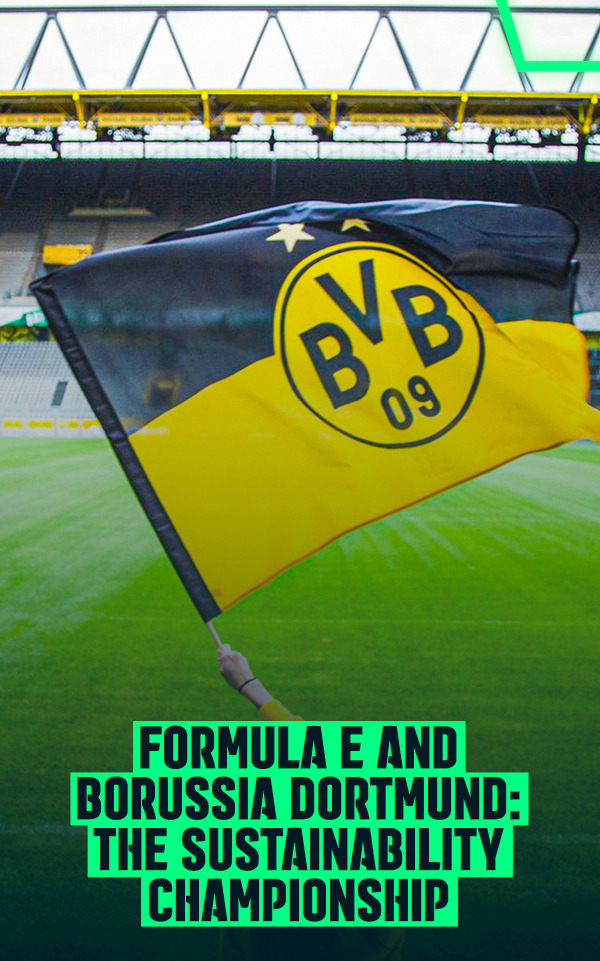Formula E and Borussia Dortmund: the Sustainability Championship

Formula E and Borussia Dortmund: the Sustainability Championship
Winning in competitions is the goal of every sports organization around the world. But where does sustainability fit, the most important current championship in the life of a sports organization?
This is where the annual report from GSBS comes in. For the third consecutive year, GSBS has released the sustainability assessment report of sports organizations, with Formula E and Borussia Dortmund in the spotlight, followed by portuguese club FC Porto, which made an exceptional debut in this ranking, coming in third place.
Firstly, what is GSBS? GSBS is an independent British non-profit organization that assesses and scores the sustainability performance of organizations in the sports industry. The report helps clubs align with EU standards, giving them an idea of their position in sustainability and a clear and comprehensive picture of the industry.
GSBS collects data in two ways: through publicly disclosed information and through direct contact with the respective sports entity. Participants include clubs/teams (71%) and associations, leagues, or competitions (29%).
As sustainability performance is the most important element, and to encourage clubs to participate, points are awarded to organizations for being transparent in their reporting. But who stands out in sports sustainability?
The report is based on four pillars: corporate, environmental, social, and governance.
In the Corporate pillar, Formula E and VfL Wolfsburg stand out with a score of 90%. Live events were also taken into account, giving special recognition FC Porto and the Mercedes-AMG Petronas Motorsport team for their commitment to corporate sustainability. The report emphasizes that in this pillar, the focus is primarily on sponsorships. According to Forbes, mission-oriented sponsorships lead sports organizations to undertake sustainability actions, highlighting the importance of leveraging influence and being selective in choosing partners.
In the Environmental pillar, climate change continues to impact the nature of sports, making environmental sustainability the most critical area of attention. However, it was the weakest performance in the report. Nonetheless, organizations are gradually playing their part: 46% actively encourage fans to use sustainable transportation, and several, including VfL Wolfsburg, Atlético de Madrid, and Real Betis, are implementing innovative solutions to reduce their environmental impact. The 'trophy' in this pillar went to Borussia Dortmund for its robust and consistent approach to environmental topics. Manchester City also received significant recognition for transparency in its emissions report, despite its major sponsor, the airline Etihad, and direct ties between its holding group and the Abu Dhabi oil and gas company.
Turning attention to the Social aspect, which has the highest performance, the sports industry's strong connection to social sustainability is evident due to its extensive history with communities. Most assessed organizations are deeply involved with local communities, with Formula E leading in social sustainability actions.
As a last point, Governance is the pillar with the second-highest performance in the report. There is a clear need for improvement, particularly in female representation, anti-corruption, and bribery. Formula E stands out positively in this aspect due to its management and organizational structure.
What can be concluded from this? It is noteworthy that sports organizations are increasingly taking correct actions, but environmental sustainability seems to escape the majority of the spotlight. Urgent changes are needed in energy use, waste management, and emissions to avoid heading in the wrong direction. It's time for organizations to act for sustainability, both within and outside competitions.
News
Historic: Women's football clubs surpass €100 Million in revenue
For the first time ever, the combined revenue of top women’s football clubs in key markets has exceeded ...
How to succeed in the Sports Industry? Four tips from Rafael Nadal
Rafael Nadal is renowned for his excellence, determination, and relentless pursuit of victory. With 22 Grand Slam ...
Al-Nassr signs Esports player for record-breaking fee
João Afonso, world champion in FIFA and EA Sports FC, known as "Jafonso," has made history with the most ...
Is Netflix prepared to stream major sporting events? Insights from the Jake Paul vs. Mike Tyson fight
The live broadcast of the Jake Paul vs. Mike Tyson boxing match on Netflix marked a significant step for the platform, ...
European Leagues and FIFPro vs. FIFA: Lawyer Gonçalo Almeida explains the complaint to the European Commission
The European Leagues, chaired by Pedro Proença, along with FIFPro, has filed a complaint with the European ...
